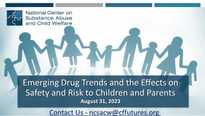Fentanyl
In the United States, fentanyl is one of the most common drugs involved in fatal overdoses.[1] These resources provide data, tools, and strategies for child welfare, substance use treatment, and courts.
Highlighted Resource
Emerging Drug Trends and the Effects on Safety and Risk to Children and Parents

Date: August 31, 2023
This webinar focused on: 1) the increase of fentanyl and other substance use across the country, and 2) the need for child welfare
... (Read More)Policy and Practice Resources
Public Safety-Led Community-Oriented Overdose Prevention Efforts Toolkit
National Council for Mental Well-Being, 2023
Presents an approach to public safety-led overdose prevention in Black, Indigenous
... (Read More)What You Need to Know About Youth & Fentanyl
National Council for Mental Well-Being, 2023
Offers information on fentanyl overdose deaths among adolescents, and a variety of
... (Read More)Up and Away
Prevention of Overdoses and Treatment Errors..., 2023
Offers a variety of resources on safe medicine storage for families. Resources
... (Read More)LawAtlas Naloxone Overdoes Prevention Laws
Prescription Drug Abuse Policy System, 2022
Features a clickable map that provides general information about states’ naloxone
... (Read More)Stop Overdose: Implementation Toolkits
Centers for Disease Control and Prevention, 2022
Offers drug overdose prevention and stigma reduction resources, including fact sheets
... (Read More)Fentanyl Facts
Centers for Disease Control and Prevention, 2022
Provides facts on fentanyl including information on prescribed and illicitly
... (Read More)Overdose Death Rates
National Institute on Drug Abuse, 2022
Provides data on drug overdose death rates (including fentanyl and other opioids).
... (Read More)Accidental Exposures to Fentanyl Patches Continue to Be Deadly to Children
U.S. Food and Drug Administration, 2021
Recommends safe storage and disposal of fentanyl patches to prevent child access.
... (Read More)Fentanyl Drug Facts
National Institute on Drug Abuse, 2021
Provides information on how fentanyl and other opioid use disorders are treated
... (Read More)Evidence-Based Strategies for Preventing Opioid Overdose: What’s Working in the United States
Centers for Disease Control and Prevention, 2018
Summarizes evidence-based strategies—such as targeted naloxone distribution
... (Read More)Position statement: Preventing occupational fentanyl and fentanyl analog exposure to emergency responders
American College of Medical Toxicology (ACMT..., 2017
Position paper on occupational exposure to fentanyl. Provides recommendations for
... (Read More)Related Online Training, Videos, and Webinars
Emerging Drug Trends and the Effects on Safety and Risk to Children and Parents
Date: August 31, 2023
This webinar focused on: 1) the increase of fentanyl and other substance use across the country, and 2) the need for child welfare
...(Read More)What is Naloxone?
Date: January 01, 2018
Depicts how naloxone works and includes information specific to fentanyl.
...(Read More)[1] National Institute on Drug Abuse. (2022). Overdose Death Rates. Drug Overdose Death Rates | National Institute on Drug Abuse
